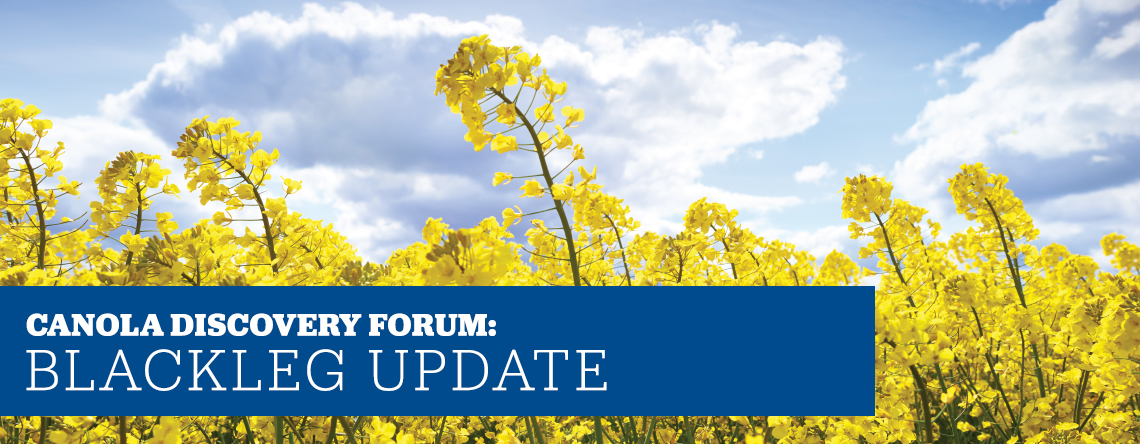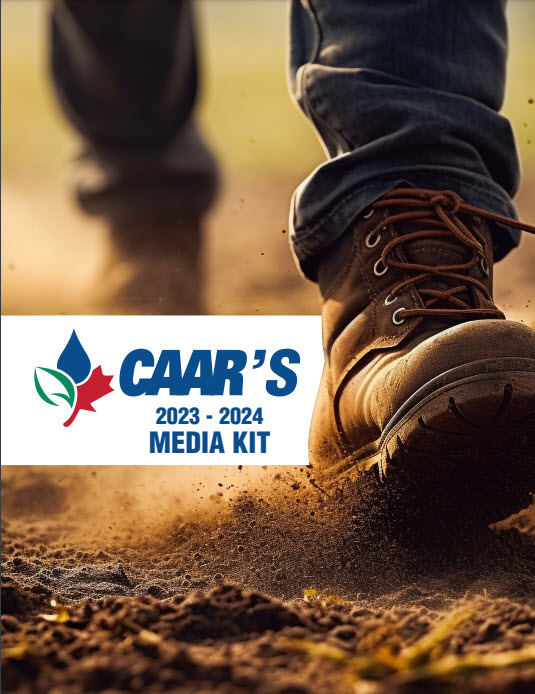Which canola diseases are on your team’s radar for the 2020 growing season? Chances are, blackleg is on that list. Found in 75% of canola fields across Canada, blackleg is a serious yield-robbing disease with market access concerns. Read more for some of the Canola Council of Canada agronomy team’s key messages and updates on blackleg.
Blackleg was just one of the numerous diseases covered at the 2019 Canola Discovery Forum. Something every canola disease including blackleg has in common, according to CCC Agronomy Director, Clint Jurke is that none of them are simple to manage.
“Each of these diseases are complicated issues, therefore we need complicated solutions,” he says. “It would be really nice if we had silver bullets, but we do need an integrated approach.”
According to Jurke, the number of Blackleg incidences across canola fields appear to be hitting a plateau in the past couple of years, something he says will be good news for communicating with international canola buyers.
When managing blackleg, Jurke emphasizes the importance of crop scouting to make accurate assessments and recommendations.
Read more about recommendations on Blackleg scouting at keepingitclean.ca.
Crop Rotation and Variety Rotation
Jurke says growers should adopt a longer rotation if scouting reveals that blackleg is a problem in their fields.
However, if growers cannot adopt a longer crop rotation, he recommends they begin rotating their canola varieties, and recommends using the Blackleg Labeling System to match races of the disease found in their field to a variety that will have appropriate resistance genetics.
Read more about the Blackleg Labeling System at blackleg.ca.
Chemical Control
“For very high-risk blackleg situations, we are encouraging growers to apply a fungicide in terms of control,” says Jurke. “We also have new tools coming for blackleg, new seed treatments are holding a lot promise.”
Foliar fungicides applied with first pass herbicide can reduce disease pressure for future seasons, but, misses the critical infection window of the current season, making seed treatments that will offer early season control particularly exciting developments.
Jurke says once these tools are commercially available, the Canola Council of Canada will begin to include use of these tools in its key blackleg messaging.
Read more about Saltro, a new seed treatment from Syngenta that has had promising trial data for early season blackleg control on CAAR News.
Industry-Wide Challenges
Jurke says that there are numerous concerns around blackleg that are pertinent to the entire industry. While he says the race test to determine the race of blackleg in the field is valuable, the industry is facing challenges on its proper usage.
“When should plants be sampled? How do we interpret those results?” he asks. “This is some of what we are struggling with as an industry.”
Jurke says this challenge is compacted because approximately half of canola seed on the market today does not use an R-Gene label.
Read more about challenges of using the Blackleg Labeling System to make recommendations to customers in the December 2019 issue of The Communicator. Featuring input from CCC Agronomy Specialist Justine Cornelsen and Manager of Nutrien Ag Solutions North Centra Alberta, Twyla Jones, this article examines the pros and cons of the system.
Tell us how your retail agronomy team is helping customers understand blackleg resistance genetics and making variety recommendations. Email This email address is being protected from spambots. You need JavaScript enabled to view it..
Related Articles
- Training Disruptions CAAR Members please be advised that upgrades to "Training to Do" will disrupt training on June 27 & 28. Upgrades to Training to Do will disrupt access the following days and times. Tuesday, June 27, 7:00 ...
- Saskatchewan Agri-Food Exports Up 75 Per Cent in Q1 The government of Saskatchewan reports that the province's agri-food exports are surging in 2023 to an estimated $6 billion in the first quarter of 2023, up 75 per cent from the same period in 2022. Leading Saskat...
- Stay current on the latest technologies and sustainable practices with ASA virtual event The Sustainable Agronomy Conference will provide Certified Crop Advisers (CCAs), Agri-Sales Professionals, and growers with the opportunity to more fully understand and implement sustainable agronomy in the field. ...
- Field Crops Report for June 2021 According to statistics Canada, the results from the June 2021 Field Crop Survey conducted with 25,000 Canadian farmers showed that farmers planted more canola, barley, soybeans and lentils, but fewer acres of wheat,...
- Virtual ASA Sustainable Agronomy Conference Starts! CAAR members may be interested in attending the US Sustainable Agronomy Conference designed for Certified Crop Advisers (CCAs), Agri-Sales Professionals, and growers which starts today, July 20, 2021. The conferen...
 How to resolve AdBlock issue?
How to resolve AdBlock issue? 


Join the discussion...
You must be logged in as a CAAR member to comment.
Report
My comments